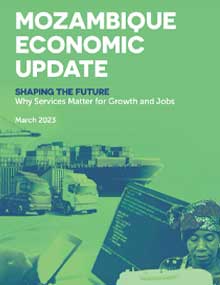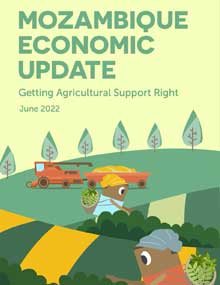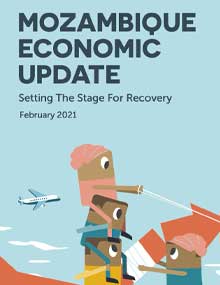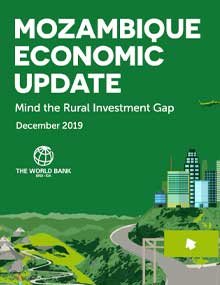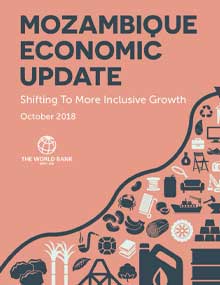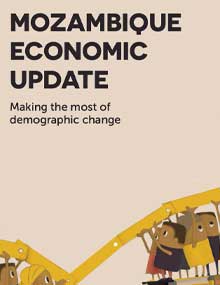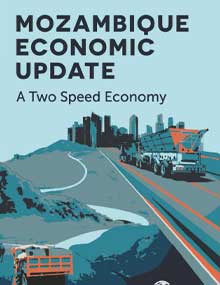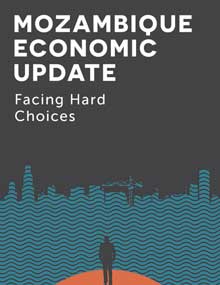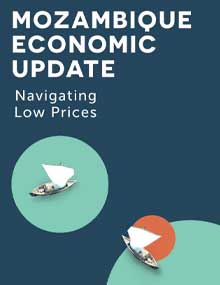Mozambique Economic Update (MEU)
Shaping the Future – Why Services Matter for Growth and Jobs
The 9th Edition of the Mozambique Economic Update explores the role of services in driving sustained, inclusive economic growth and accelerated job creation, and discusses reform options to unleash the potential of services. The report shows that, despite being the largest (in terms of output share) and relatively the most productive sector, services are oriented towards less complex activities such as retail. Mozambique’s commercial services exports are dominated by traditional services (travel and transport). Therefore, services need to upgrade into more sophisticated and tradable activities such as ICT, finance, and professional and business services, to become an engine of inclusive growth and employment creation. Sustained, broad-based growth will also require raising productivity in services and stimulating the formalization of informal firms, while strengthening linkages between sectors.
Getting Agricultural Support Right
The 8th edition of the Mozambique Economic Update focuses its analysis on the potential offered by agriculture to promote a sustainable and more inclusive recovery and outlines reform options to realign agricultural support policies to achieve competitiveness, climate resilience, and food security objectives. In its first section, the report assesses the country’s economic recovery in the face of the crisis caused by COVID-19 and presents its economic outlook.
Setting the Stage for Recovery
The global pandemic has taken a heavy toll on Mozambique’s economy. In 2020, the country experienced its first economic contraction in nearly three decades. While there is great uncertainty about the path of the pandemic, the economy is expected to gradually recover from 2021 as aggregate demand rebounds and liquefied natural gas investments and extractive production gain momentum. Despite the expected recovery, the widespread deployment of COVID-19 vaccines will be at the core of a resilient recovery. This Economic Update explores the implications of COVID-19 for the economy, businesses, and households. It makes recommendations for moving forward—in the short-term relief phase, as well as over the medium and longer-term in order to 'build back better.’
Mind the Rural Investment Gap
Reducing the growing infrastructure disparities between urban and rural areas is crucial for more inclusive and sustainable growth, says the latest World Bank Mozambique’s Economic Update. The macroeconomic context is improving, but growth remains low; future liquified natural gas (LNG) investments are expected to help steer growth from a low of 2.3% in 2019 towards 5% by 2021. As the gas sector develops, strengthening linkages with the rest of the economy will be critical for job creation whilst continued progress in fiscal management will further improve the setting for public investment and inclusive growth.
Shifting to More Inclusive Growth
Mozambique is beginning to emerge from a period of elevated macroeconomic volatility two years after hidden debt revelations triggered a significant economic downturn, but with a reduced capacity for growth. Having averaged nearly 8% between 2005 and 2015, GDP growth dropped to 3.7% in 2017 and is projected to fall further to 3.3% in 2018 as slower growth in coal production is expected to offset any modest upturn in manufacturing and services. Fiscal consolidation is making progress, but debt levels continue to be a concern. In an analysis of the structure and drivers of Mozambique’s growth over the past two decades, the report notes that progress in reducing poverty levels has come at the expense of rising inequality. Therefore, shifting the growth model to broaden the drivers of growth and to raise productivity in sectors with the highest employment potential is a primary challenge facing Mozambique’s policymakers today.
Making the Most of Demographic Change
Developments in the second half of 2017 indicate that the slowdown in Mozambique's economic performance may be taking hold, shifting this once fast-growing economy to a more modest pace of growth. GDP growth is expected to dip to 3.1% in 2017, despite substantial increases in coal and aluminum exports. Whilst these exports boomed, small and medium enterprises have fallen back even further, especially in the manufacturing sector, which contracted for this first time since 1994. Current trends make it clear that Mozambique needs to redouble its efforts to support small and medium enterprises, and to look beyond the extractive sector for more balanced growth. The drift towards a natural resource extraction-based economy with low employment generation makes the case for Mozambique to leverage its growing and youthful population to provide for future growth.
A Two-Speed Economy
Mozambique is increasingly becoming a “two-speed economy,” as extractives and other large industries drive improvements in growth while other sectors lag behind. This Mozambique Economic Update highlights how Mozambique’s non-extractive small and medium enterprises—which had been growing—are being disproportionately affected by the economic downturn. It calls for a sharper response in fiscal policy to help restore the health of Mozambique’s public finances and support the easing of monetary policy as the economy continues to adjust.
Facing Hard Choices
This Mozambique Economic Update includes a section on recent economic developments and a discussion of Mozambique’s economic outlook, followed by a focus section(s) analyzing issues of particular importance. This has been a testing year for Mozambique. An ongoing downturn, brought about by low commodity prices, drought and conflict, was compounded by the fallout from the discovery of hidden debts in April 2016. The level of debt took an explosive path with the addition of the previously undisclosed loans, making Mozambique one of the countries in Africa with the highest debt-to-GDP ratios. Clearly, Mozambique’s macroeconomic stability has been shaken up. The agenda for restoring economic stability and confidence will stretch into 2017 and possibly beyond.
Navigating Low Prices
The new economic update shows that Mozambique continues to face challenges brought on by global economic weakness and growing fiscal risks. The report says persistently low commodity prices and regional drought will further decelerate growth in 2016. Analysis of fiscal risk highlights the need for improved monitoring, disclosure, and management of debt while strengthening the government’s capacity to manage public investments.
